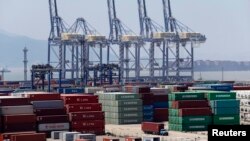China has released unexpectedly poor trade data for June, in a further sign of weakness in the world's second largest economy.
Government figures showed exports fell 3.1 percent from a year earlier. That is well below market expectations of around four percent growth. Imports also dropped 0.7 percent, a figure much weaker than forecast. China's trade surplus fell to just over $27 billion.
Customs spokesperson Zheng Yuesheng told reporters China's foreign trade is facing "grave challenges" and warned the third quarter export outlook is "grim." He blamed weak foreign demand for Chinese products, rising labor costs, and a stronger yuan currency.
Some slowdown in China's trade growth was expected in June because of a government crackdown on faulty data by exporters, which led to inaccurate trade figures earlier in the year.
China's government has expected slower economic growth as it attempts to transition from a reliance on exports and toward greater domestic consumer demand.
But Robert Blohm with the Hong Kong-based Keen Resources Asia consultancy tells VOA the weak import numbers suggest Beijing is having a difficult time boosting domestic consumption.
"The decline in imports in June, which shows the domestic economy, means the so-called consumer economy isn't going anywhere, either," he said.
Blohm says evidence of China's slowing economy is seen in the many moribund construction projects spread across the country.
"There are blocks of residential compounds and they have cloths up around the sides of the buildings to prevent a lot of dust from going in and deteriorating them. There's no work going on, and you see that in all Chinese cities," he explained.
China's economy is attempting to rebound from a prolonged slowdown, which follows three decades of staggering growth. Its economy grew 7.8 percent last year, its worst performance in 13 years. Beijing has set a modest growth target of 7.5 percent for 2013.
The latest data comes after the International Monetary Fund this week predicted slower global growth with a warning that China faces a risk of a "large decrease in growth."
Analysts say the restructuring of China's economy toward domestic consumption is likely to be a long and gradual process. But some analysts say the latest trade figures could prompt the government to temporarily delay that process in order to stimulate growth and avoid social instability.
Government figures showed exports fell 3.1 percent from a year earlier. That is well below market expectations of around four percent growth. Imports also dropped 0.7 percent, a figure much weaker than forecast. China's trade surplus fell to just over $27 billion.
Customs spokesperson Zheng Yuesheng told reporters China's foreign trade is facing "grave challenges" and warned the third quarter export outlook is "grim." He blamed weak foreign demand for Chinese products, rising labor costs, and a stronger yuan currency.
Some slowdown in China's trade growth was expected in June because of a government crackdown on faulty data by exporters, which led to inaccurate trade figures earlier in the year.
China's government has expected slower economic growth as it attempts to transition from a reliance on exports and toward greater domestic consumer demand.
But Robert Blohm with the Hong Kong-based Keen Resources Asia consultancy tells VOA the weak import numbers suggest Beijing is having a difficult time boosting domestic consumption.
"The decline in imports in June, which shows the domestic economy, means the so-called consumer economy isn't going anywhere, either," he said.
Blohm says evidence of China's slowing economy is seen in the many moribund construction projects spread across the country.
"There are blocks of residential compounds and they have cloths up around the sides of the buildings to prevent a lot of dust from going in and deteriorating them. There's no work going on, and you see that in all Chinese cities," he explained.
China's economy is attempting to rebound from a prolonged slowdown, which follows three decades of staggering growth. Its economy grew 7.8 percent last year, its worst performance in 13 years. Beijing has set a modest growth target of 7.5 percent for 2013.
The latest data comes after the International Monetary Fund this week predicted slower global growth with a warning that China faces a risk of a "large decrease in growth."
Analysts say the restructuring of China's economy toward domestic consumption is likely to be a long and gradual process. But some analysts say the latest trade figures could prompt the government to temporarily delay that process in order to stimulate growth and avoid social instability.





